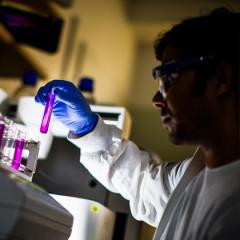Australian Institute for Bioengineering and Nanotechnology research in areas stretching from advanced diagnostics and sustainable aviation fuel production to thermal conduction has received Australian Research Council (ARC) funding.
AIBN researchers are leading projects which attracted nine ARC Discovery Project (DP) grants totalling more than $5.7 million, while two researchers received Discovery Early Career Research Awards (DECRAs) and two were awarded Future Fellowships.
DECRAs were awarded to Dr Frank Sainsbury and Dr Yuling Wang and Future Fellowships to Dr Chenghua Sun and Dr Zhongfan Jia.
Prof Debra Bernhardt will lead work on two DP grants totalling $810,000, including investigations of heat flow in lithium ion batteries which has resulted in the grounding of aircraft; and the properties of nonequilibrium steady states.
Prof Michael Yu will use $450,000 in funding to lead research to design safe and efficient nanoparticles for targeted delivery in gene therapy, cancer treatment and bio-imaging.
Prof Michael Monteiro will design polymer nanoparticles that interact with, or mimic, biological systems using new synthetic approaches to introduce function with predictable behaviour using $420,000 in funding.
Prof Lars Nielsen and Dr Claudia Vickers will use $376,000 to understand biochemistry inside microbial cells so they can engineer the cells to produce industrially-useful biochemicals, including biofuels, pharmaceuticals and rubbers.
Dr Kris Thurecht will lead a research collaboration aiming to manipulate nanomaterial properties to develop better diagnostic, treatment and monitoring capabilities for patients, using $370,000 in funding.
Prof Justin Cooper-White and Dr Jess Frith will work with collaborators on a $365,000 project aiming to drive adult stem cells, called mesenchymal cells, to regenerate damaged or diseased tissue using smart biomaterials.
A/Prof Idriss Blakey aims to use light to control the nanostructure of a new generation of materials used in high-performance computer chips, hard drives, batteries and membranes, with $360,000 in funding.
Prof Matt Trau and Dr Muhammad Shiddiky will share $330,000 to develop a new diagnostic technology capable of detecting even low concentrations of tumour cells in cancer patients.
Dr Sun will use the $717,000 in funding associated with the fellowship to investigate the use of red titanium and solar energy to produce hydrogen, a clean fuel, from water.
Dr Jia will develop a method for sculpting three-dimensional scaffolds that control the growth of stem cells for use in regenerative medicine, with $755,000 in funding.
Dr Sainsbury will use $395,000 in funding to develop a nano-container to deliver vaccines to specific immune cells to stimulate a broadly protective response against infectious diseases such as influenza.
Dr Wang has $380,000 to establish a detection platform for rapid, highly-sensitive, point-of-care diagnostics capable of detecting biomarkers that point to the presence of tumours in breast cancer patients.


